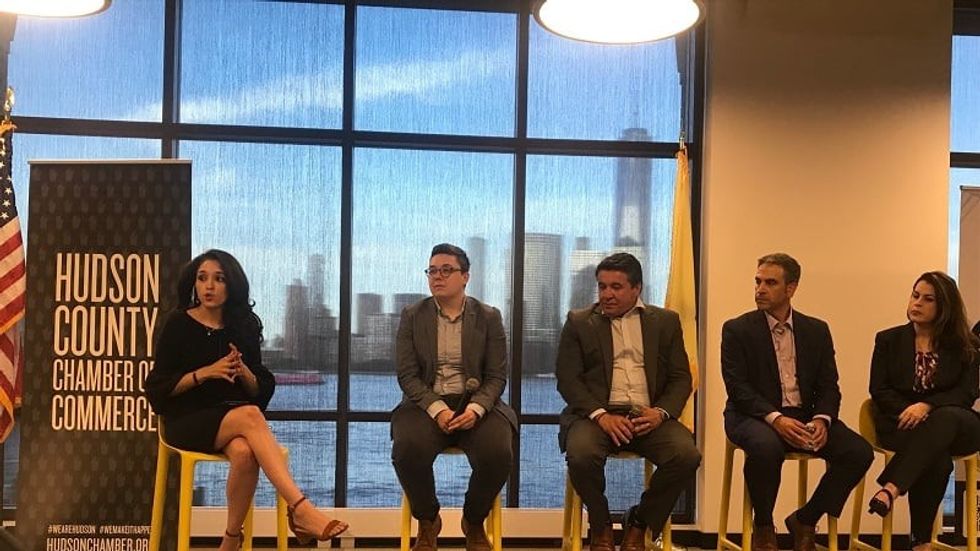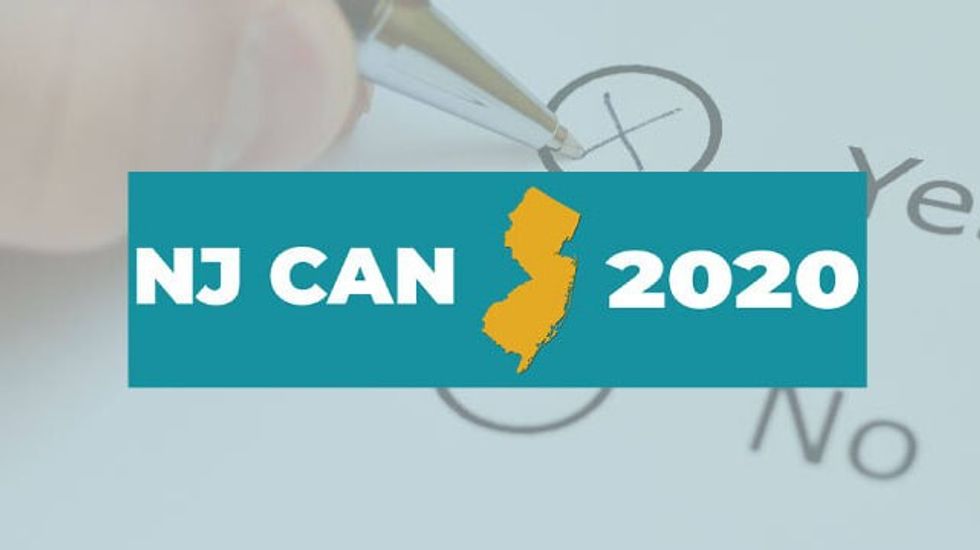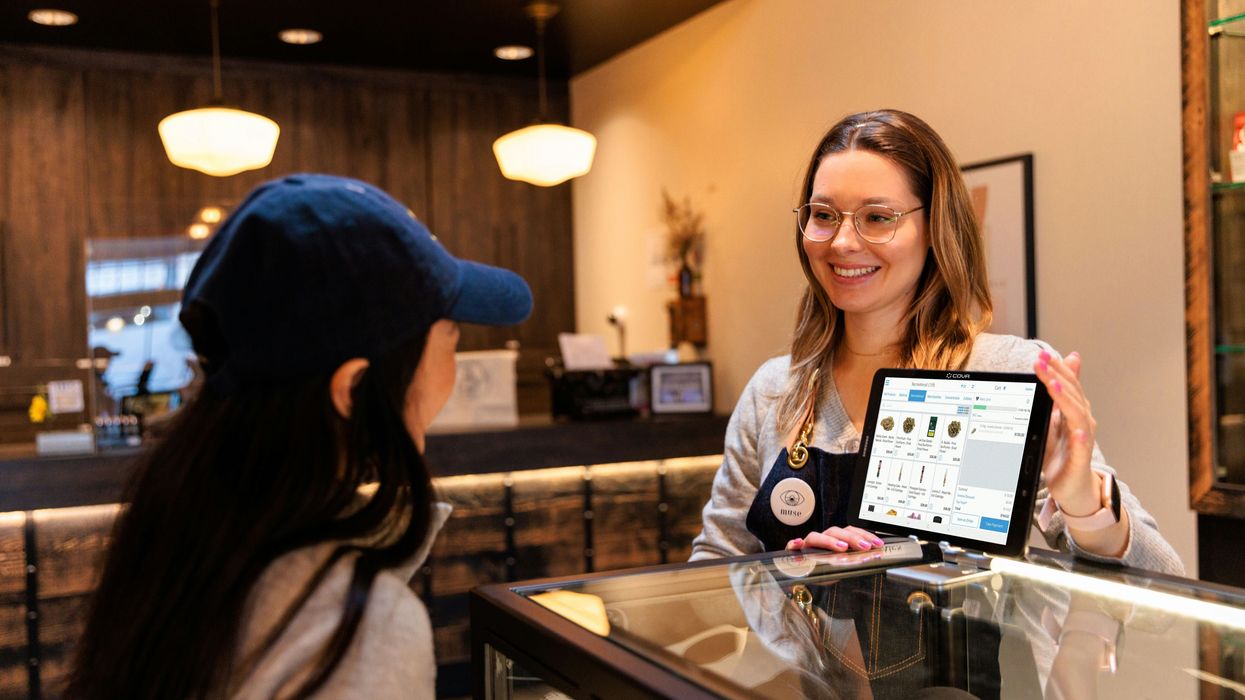Jessica Gonzalez is a Hispanic lawyer who has been fighting for New Jersey cannabis legalization and an equitable market. Public Question 1, the constitutional amendment legalizing adult-use cannabis, is on the state's November 3rd ballot where early voting has begun.
While confident that legalization will pass, especially given recent polling , Gonzalez is hoping people remember that Public Question 1 is on the back of the ballot.
“I’m just hoping people turn their ballot,” Gonzalez said. “This is a once in a lifetime opportunity.”
Gonzalez is currently a leader of NJ CAN 2020, the pro-cannabis coalition formed to legalize adult-use cannabis in New Jersey. NJ CAN 2020 touts the NJ NAACP, the Latino Action Network, ACLU and other minority leaders as part of their effort to change the state's constitution.
Undoing the harm done by the War on Drugs has become a major talking point for Gonzalez and NJ CAN 2020, as a recent ACLU study found that Latinos and Black Americans are arrested four times more than whites for low level marijuana offenses.
This is especially poignant because many are unhappy that the national cannabis industry is dominated by White men who seem indifferent to that issue.
Many experts agree that New Jersey is a pivotal state in advancing federal legalization due to the "cannabis domino effect" . Simply put, approval in NJ forces mega states such as New York, Connecticut and Pennsylvania to follow suit creating a multi-billion dollar East Coast market that will be hard for Congress to ignore.
Protecting Minority Cannabis Business Owners
Gonzalez was born in Ecuador and came to the United States when she was three years old, her family settling in New Jersey.
Once she became a lawyer, she began working in intellectual property (IP) protection and quickly grew restless.
“I began thinking to myself of the constants of my life, and that included my spiritual beliefs and cannabis, which I benefited from for years,” Gonzalez said.
“I wasn’t fulfilled using skills toward a cause that did not change or affect the lives of people,” she said.
So, Gonzales began attending cannabis industry events where she saw people with noteworthy company names and brands left open to liability. In her opinion, most of these owners assumed that neither their products nor ancillary businesses could receive IP protection.
“I was seeing lawyers giving terrible advice that you can’t acquire IP protection. I knew something was wrong,” Gonzalez said.
As a specialist in protecting the IP of corporate brands, Gonzalez quickly pivoted her skills into cannabis.
“I always tell folks to use the skills you have and pivot them,” Gonzalez said.
Gonzalez recommends that businesses seeking to protect their assets, such as education, merchandise or paraphernalia, take the necessary steps to receive trademark protection.
“Trademark registration is ownership, and ownership is everything right now,” she said.
Gonzalez said it is an area many do not consider until it becomes a problem.

“Folks don’t realize that for largest companies in the world, their trademark is a top three, most valuable asset,” Gonzalez said. “If you want to be a million-dollar company, you need to take steps to be one.”
Gonzalez said businesses should take inventory of their property assets, including websites, logos, graphics, brand name, inventions, trade secrets and proprietary recipes to understand what needs to be protected.
Gonzalez laments that minority entrepreneurs and business people are more susceptible to become victims of predatory contracts because they are not aware of what they are signing.
Gonzalez believes it’s “important to be able to have legal counsel look over it, so you don’t sign away your rights.”
She added fixing a contract is harder and leaves an entrepreneur more open to liability, especially in communities of color.
Gonzalez said her clientele is 85 percent minorities or women and include plant-touching businesses, CBD retailers, hemp farmers, cannabis educators, cannabis marketing firms, and product manufacturers.
A lot of people want to get involved, but lack the education on what it takes, and the money needed. So, I’ve seen a lot of dreams die due to lack of capital. That’s one thing I’d like to see change.
Jessica Gonzalez
“It's a privilege for me to work in this space. I believe in this plant and that makes a difference when you’re fighting for something you believe in."
Gonzalez said going to her Latina mother to tell her she was leaving her cushy job for cannabis was not an easy task. However, seven months into it when she found success, her mother said, “Mija (my daughter) I’m so proud of you.”
Her whole family is now on board and has already voted for legalization.
“It took me to break the mold on it, educate them on the benefits. If you can educate your community of friends and family, you can educate anybody,” she said.
Are you still missing out on The Bluntness newsletter? Sign Up today to stay in the loop.











 Best Weed Smoking Games to Try - Jammin'
Best Weed Smoking Games to Try - Jammin' The 31 Best Weed Smoking Games To Try
The 31 Best Weed Smoking Games To Try The Best Weed Smoking Games
The Best Weed Smoking Games The Best Weed Smoking Games to Try
The Best Weed Smoking Games to Try

 Stoner Games - Games to Play While High
Stoner Games - Games to Play While High The Best Weed Smoking Games to Play
The Best Weed Smoking Games to Play The Best Weed Smoking Games to Try
The Best Weed Smoking Games to Try
 The Best Weed Smoking Games to Try
The Best Weed Smoking Games to Try
 The Best Weed Smoking Games to Play
The Best Weed Smoking Games to Play The Best Weed Games to Play
The Best Weed Games to Play The Best Weed Smoking Games to Try
The Best Weed Smoking Games to Try The Best Weed Smoking Games to Play
The Best Weed Smoking Games to Play The Best Weed Smoking Games to Try
The Best Weed Smoking Games to Try Games for Stoners
Games for Stoners  woman in white and blue floral shirt sitting beside woman in white and black floral shirtPhoto by
woman in white and blue floral shirt sitting beside woman in white and black floral shirtPhoto by 
 The Best Weed Smoking Games to Play
The Best Weed Smoking Games to Play
 The Best Weed Smoking Games to Try
The Best Weed Smoking Games to Try The Best Weed Smoking Games to Try
The Best Weed Smoking Games to Try world map with pinsPhoto by
world map with pinsPhoto by 
 The Best Weed Smoking Games to Try
The Best Weed Smoking Games to Try






 The Truth About THC Candle: Cannabis Candles & How to Make Your Own - The Bluntness
Photo by
The Truth About THC Candle: Cannabis Candles & How to Make Your Own - The Bluntness
Photo by 
 Humankind has been using THC for millennia.
Humankind has been using THC for millennia. Those little, sugar-like crystals are the sticky trichomes that house special chemicals including cannabinoids and terpenes.
Those little, sugar-like crystals are the sticky trichomes that house special chemicals including cannabinoids and terpenes. Raw cannabis typically contains very little THC. Instead you get non-psychoactive THCA, which is converted into THC.
Raw cannabis typically contains very little THC. Instead you get non-psychoactive THCA, which is converted into THC. Cultivators are now breeding cannabis not just for THC, but other cannabinoids such as CBD, THCV, and more.
Cultivators are now breeding cannabis not just for THC, but other cannabinoids such as CBD, THCV, and more. Getting the most out of cannabis usually requires a bit of guidance and patience.
Getting the most out of cannabis usually requires a bit of guidance and patience. A lot of people think CBD is medical, and THC is for fun. This is an unfortunate misconception.
A lot of people think CBD is medical, and THC is for fun. This is an unfortunate misconception. THC has a surprising amount of medical benefits.
THC has a surprising amount of medical benefits. For some the cannabis high is an unwanted side effect, for others it's the main show.
For some the cannabis high is an unwanted side effect, for others it's the main show.
 How Long Do Shrooms Last? Magic Mushroom Guide for Beginners - The Bluntness
How Long Do Shrooms Last? Magic Mushroom Guide for Beginners - The Bluntness Psilocybin can provide a life-altering experience. -The Bluntness
null
Psilocybin can provide a life-altering experience. -The Bluntness
null
 “Don’t diddle the dose. Once you have done your homework, go for it.” -- Terence McKenna
The Bluntness
“Don’t diddle the dose. Once you have done your homework, go for it.” -- Terence McKenna
The Bluntness These mushrooms taste gross, but there are ways around that.The Bluntness
These mushrooms taste gross, but there are ways around that.The Bluntness These mushrooms taste gross, but there are ways around that.
These mushrooms taste gross, but there are ways around that.
 What will you do with that cannabis kief collection? - Make Coffee! The Bluntness
What will you do with that cannabis kief collection? - Make Coffee! The Bluntness DIY: How to Make Kief Coffee - The Bluntness
Photo by
DIY: How to Make Kief Coffee - The Bluntness
Photo by